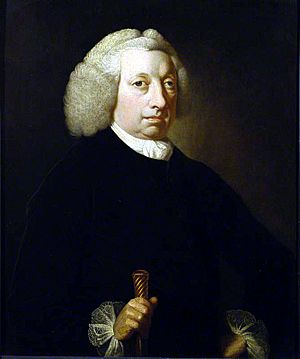John Huxham facts for kids
John Huxham (1692–1768) was a smart English doctor who lived a long time ago. He was especially known for studying fevers, which were a big problem back then. In 1750, he wrote an important book called Essay on Fevers. Because of his great work in medicine, he received a special award called the Copley Medal in 1755.
A Doctor's Life
John Huxham was born near a town called Totnes in England. He grew up without his parents and was looked after by a religious minister. He went to school and then studied medicine at different universities, including one in Leyden and another in Rheims. He couldn't go to the famous universities in Oxford or Cambridge because of his religious beliefs at the time.
After finishing his studies, John Huxham went back to his home area. He started working as a doctor in Plymouth. It took some time, but he slowly became one of the most respected doctors in the city.
Studying Weather and Sickness
In 1723, a group of scientists called the Royal Society asked doctors to help them. They wanted people to keep daily records of the weather, like how much rain fell, the temperature, and wind. John Huxham started doing this in 1724. From 1728 to 1748, he also wrote down how common different sicknesses were each month. He later published these important records in two books. Because of his scientific contributions, he became a member of the Royal Society in 1739.
Important Medical Discoveries
John Huxham was probably the first person in Britain to describe and classify the disease influenza, which we now call the flu. He also helped people understand scurvy, a disease caused by not getting enough vitamin C. He suggested that drinking cider could help cure it.
He is also remembered for a special medicine called Tinct. cort. Peruv. Huxham. This was a liquid made from Cinchona bark. It was used to treat bad sore throats, possibly even diphtheria.
John Huxham passed away on August 11, 1768. His son, John Corham Huxham, also became a scientist and helped publish some of his father's medical writings.
 | Emma Amos |
 | Edward Mitchell Bannister |
 | Larry D. Alexander |
 | Ernie Barnes |


